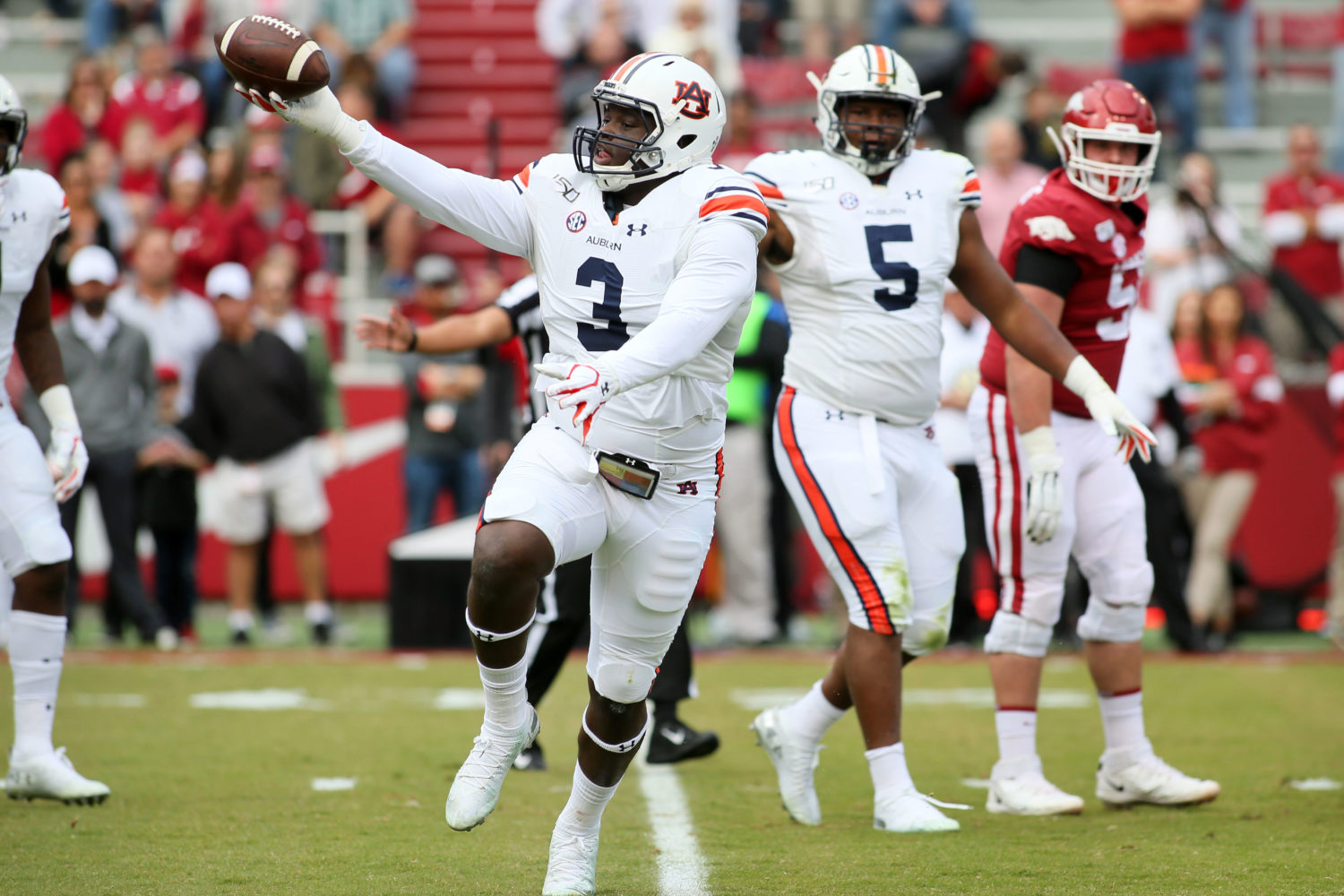
Auburn football: How the Tigers’ defense stands up to Joe Burrow
By Brian Stultz
Published:
The Auburn secondary has already been tested this season, facing Oregon’s Justin Herbert, Texas A&M’s Kellen Mond and Florida’s Kyle Trask in their first 6 games of the season, but a new and immense challenge awaits them Saturday: Joe Burrow and an LSU offense that has become the hot thing in college football.
How can the Tigers slow down Burrow and an offense that seems impossible to derail? It will start with physicality.
It should come as no surprise that LSU’s wide receivers are big, fast and strong, so jamming at the line of scrimmage will be key, especially against the slant route. It is no secret that Burrow will want to get rid of the ball as fast as he can to help counter Auburn’s pass rush, so the quick slant route will be seen often.
Let’s not forget what happened on the opening drive against Florida. Kyle Trask hit Freddie Swain on a quick route and, after a couple of missed tackles, he was gone for a 64-yard touchdown.
Between Justin Jefferson (759 yards, 9 TDs), Ja’Marr Chase (626 yards, 9 TDs) and Terrace Marshall Jr. (304 yards, 6 TDs) who is expected to return from an injury and be available, Burrow’s choices are almost unlimited. Noah Igbinoghene and Javaris Davis will have their hands full. Miss a tackle, and LSU’s receivers can outrun the defense, so limiting the yards after catch will be paramount. You can live with a 5-yard gain, but letting that go for 20 or more yards can break a defense’s will.
The challenge is: Burrow doesn’t throw many short completions.
More than half of his completions (91 of 173) have covered at least 10 yards.
Burrow leads or shares the SEC lead in completions covering 20+ yards (37), 30+ yards (17), 40+ yards (10), 50+ yards (6) and 60+ yards (4).
Auburn has seen him before, but not quite like this.
In LSU’s last year’s 22-21 last-second victory in Jordan-Hare Stadium, Burrow was cool, calm and collected under pressure, converting a couple of 4th downs on the final drive to get the Tigers into field goal range before Cole Tracy nailed the game-winner. But looking at what the defense did against the LSU quarterback — he finished 15-of-34 for 249 yards and a touchdown — is encouraging even if that Burrow, only in his 3rd game as the Tigers’ starter — was a different player in a far different system than the one Auburn will encounter Saturday.
Costly in that Auburn loss were pass interference calls that, while some were legitimate, may have been borderline. It is OK that Kevin Steele teaches his secondary to face-guard the receivers — I swear Auburn fans, it is — but with a veteran group like Jefferson and Co., falling into the trap of letting them sort of force the contact cannot happen. These receivers are proficient at playing off a defensive player to get the edge.
Lastly, the deep ball, which the Auburn defense has been extremely good at not giving up, has once again become a threat for LSU.
As stated, these are big and fast receivers and will be guarded by some undersized corners, so help from safeties Daniel Thomas and Jeremiah Dinson along with Christian Tutt will be necessary. Seemingly every time these two play, regardless of who is behind center for LSU, the Tigers are able to find some deep ball connections. Auburn must limit LSU’s explosive plays.
Burrow and LSU have proven that they can put points up against the best, posting 45 points at Texas and 42 against Florida 2 weeks ago. The Tigers are averaging 50.1 points per game, 2nd in the nation behind only Oklahoma.
Burrow leads the nation with 29 TD passes, already an LSU record and well ahead of pace to break Drew Lock’s single-season SEC mark of 44.
Before the season, Herbert and Tua Tagovailoa were considered the best QBs Auburn will face this year. Burrow has forced his way into that conversation and quite possibly changed the ranking entirely.
Auburn’s defense rose to the challenge against Herbert. If the Tigers can keep making the sure tackle, limit the deep pass and yards after catch, and hope the defense line creates panic, Malzahn’s squad could pull off the upset.
Brian Stultz covers SEC football for SaturdayDownSouth.com. A graduate of Auburn University, he is a member of the Football Writers Association of America. You can follow him on Twitter @brianjstultz.







